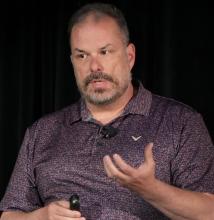Platform engineering represents the next stage in DevOps.
While Kubernetes (like other technologies) can be excellent starting points, they are not the ultimate goal in delivering on the promise of platform engineering. Kubernetes can provide a strong foundation for building comprehensive platforms, but more is needed to fully develop a platform that enables developers to deliver with substantial autonomy. In real terms, this means increasing decentralized decisioning, faster flow, faster times to recovery, and, overall, happier developers.
In "Platform Thinking: Strategies for Building Effective Platform Teams," we will dive into the essentials of modern platform engineering. The workshop discusses the importance of a product mindset, domain-driven design, developer experience, and team topologies in building a well-architected system with the platform as a key enabler. Hands-on approaches to reducing developer cognitive load while delivering on orchestration, continuous delivery, observability, governance, and security are key workshop components.
Platform engineering teams are central to how modern teams deliver on the promise of devops today. This workshop is all about strategies for building effective platform teams today.
Workshop Outline:
* Platform Engineering (Goals, Principles, & Approach)
* Delivery Plane (Kubernetes)
* Developer Control Plane (Inner Loop, Outer Loop & GitOps)
* Observability, Security, & Compliance/Governance Planes
* Developer Experience & Developer Portals
* PE PoV: Business Value Articulation
Key Takeaways
1 Platforms are the next evolution of DevOps, helping teams reduce the cognitive load required in modern cloud-native systems.
2 There is no one-size-fits-all platform. The best approach is to start with a clear business objective, deliver in small increments, and measure the effectiveness of each.
3 Platforms should simplify how developers meet organizational NFRs around security, observability, compliance, and reliability.
4 Developer portals are key to enabling self-service and should prioritize the developer experience.
Speaker

Wes Reisz
Technical Principal @Thoughtworks, 16-Time QCon Chair, & Creator of The InfoQ Podcast
With over 20 years of delivering and architecting sociotechnical systems, Wesley Reisz has led the technical delivery of multi-million dollar software projects, chaired numerous software conferences across North America (and the United Kingdom), created a highly respected podcast, and spent over a decade teaching 400-level software architecture/programming courses as an adjunct professor. These experiences have given him deep expertise in software architecture, cloud-native engineering, team topologies, and platform thinking (alongside a broad knowledge of different software domains).
Wes is a Technical Principal at Thoughtworks, where he specializes in reducing complexity in software through systems thinking, application modernization, platform engineering, and AI-First Software Delivery. Embodying the concept of a T-shaped engineer (blending broad expertise across a wide range of software domains with deep technical knowledge of the cloud-native ecosystem), Wes strongly believes in the transformative power of sharing knowledge through speaking, teaching, and continuous learning.
You can reach Wes via:



